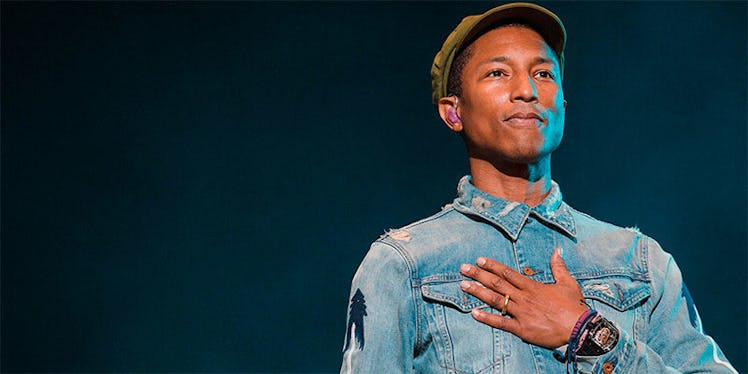
Why Pharrell Williams Is A True Role Model For The Creative Minds Of Generation-Y
As a student, Pharrell Williams was like most kids who find that what they learn in the classroom does not help nurture their true talents and enthusiasms: productive, perhaps, but largely disinterested.
"I spent a lot of time in school not paying attention," he told Fast Company's Mary Kaye Schilling, who wrote a feature on Williams in November. It was an admission that came after Pharrell had lamented the way in which, he feels, school is designed to fit everyone into small, distinct boxes.
"The school system isn't spending a lot of time looking for specific potential. We are bred to be worker bees; to grow up, get married, have a kid, drive a Volvo, do our taxes, invest in something, find a hobby."
To some, the path that Pharrell has outlined might sound like a pretty good idea. After all, European cars are some of the finest on earth. The music producer’s point wasn’t made to criticize, however; it was made to express a displeasure in the way a generation is being pressured to live up to a subjective idea of success.
Whatever idea was used to measure Pharrell's aptitude, it’s clear he wasn’t interesting in meeting it. Like most who are disinterested in a type of education that they see as the undesirable "standard," he didn’t go to college, either.
However, the Virginia Beach native has achieved more than most teachers could ever dream for their students. In the past 12 months, he’s produced top hits, designed clothing and curated art amongst other endeavors that earn him $10 million a year, after taxes.
Now, at the age of 40, it’s fair to say that Pharrell has had a good amount of success throughout his career. It’s also fair to say he’s done it in an unorthodox manner, if not for anything more than the mere fact that aspiration for success in the arts is a generally discouraged idea.
Still, the three-time Grammy award winner knows there are artists like him out in the world, more people out there finding it hard to perform at a high level in ways that simply don't suit their passion, or worse, their capabilities.
It's the reason why, when he has a chance to mentor young artists, he guides them in a manner that's suited to their goals. “What do you want?” and “What haven’t you done?" are the first two questions Williams asks of his protégés. His focus, he says, is on "actualizing potential,” the task of recognizing a talent and breeding it, which is an ideology that Sir Ken Robinson has been banging about for years.
But Pharrell doesn't have to listen to any philosopher, or tune into the latest TED Talk on education, to reach the conclusions he had on helping grow the creative mind.
As a man whose best works ooze creativity in abundance, the musician is bound to know how to appeal to anyone who considers his or herself to be an artist at any capacity. Above all else, though, it's in his nature to listen to others and, as he says, "Be quiet and absorb."
"P's energy is endless," says Craig Shapiro, founder of Collaborative Fund, an investment fund with which Pharrell has partnered. "And his thirst for knowledge is unparalleled. He truly enjoys learning new things and meeting new people--something most people are overwhelmed by."
Tyson Toussant, another partner of Pharrell's, says that the artist's influence on designs is highly impacted by his wide range of interest. "P's interested in so many things, and whatever he's working on at the time, he brings inspiration from that," Toussant told Fast Company.
The image Shapiro and Toussant paint, of a man whose explosive artistic talent stems from an unquenchable thirst to learn, defies Williams' history as a young employee in multiple workplaces before his music career began.
"I got fired--every time," he says. "I had good managers; I was just lazy."
If anything, though, Pharrell's deficiency and disinterest in school, and at jobs he didn't care about, should provide a lesson when compared to his efficiency in the arts. It might as well serve as a testement to the many possibilities there are for success when a person's talent is matched with their purpose or, quite simply, their work.
For a man who's managed to design accessories for Louis Vuitton, created sculptures with Takashi Murakami and teamed with Nigo, the founder of A Bathing Ape, on several clothing lines, including Billionaire Boys Club, and produced record hits, it's clear that Pharrell's passions match his purpose.
Although much of his success can directly be traced to his decision to forgo the university route, the 40-year-old says his career experiences make up for what he lacks in "traditional" schooling.
"All of this is school for me," he told the New York Times' Jesse Ashlock. "I didn’t go to college. This is my college."
While the musician's facial features defy his age, referring to him as a "kid" would be pushing it. For his success in artistry and refusal to bow to the pressures of any subjective ideas of intelligence, however, Pharrell Williams deserves to be regarded as a poster child for the creative minds of Generation-Y.